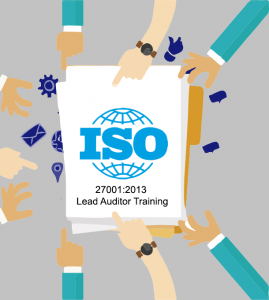Introduction:
The ever-growing threat landscape in the digital age has necessitated robust information security management systems (ISMS) to safeguard sensitive data. ISO 27001, an internationally recognized standard for information security, provides a framework for establishing, implementing, maintaining, and continually improving an ISMS. One key role in ensuring compliance and effectiveness of an ISMS is that of an ISO 27001 Lead Auditor. In this article, we will explore the importance of ISO 27001 Lead Auditor training and the essential skills required to excel in this role.
I. Understanding ISO 27001:
Before delving into the specifics of Lead Auditor training, it’s crucial to have a solid understanding of ISO 27001. The standard outlines a risk-based approach to information security and provides a systematic method for managing and protecting sensitive information. A Lead Auditor needs to comprehend the intricacies of ISO 27001 to assess an organization’s compliance effectively.
II. The Role of an ISO 27001 Lead Auditor:
An ISO 27001 Lead Auditor plays a pivotal role in evaluating the effectiveness of an organization’s ISMS. This involves conducting thorough audits to ensure that the system is not only implemented but also continually improved. The Lead Auditor must possess the ability to assess risks, identify vulnerabilities, and recommend corrective actions.
III. ISO 27001 Lead Auditor Training:
- Formal Education and Certification: ISO 27001 Lead Auditor training often starts with formal education in information security or a related field. A bachelor’s or master’s degree can provide a foundational understanding of the principles and concepts that underpin ISO 27001.
- ISO 27001 Specific Training: Specialized training courses designed for ISO 27001 Lead Auditors are essential. These courses cover the standard in-depth, focusing on interpretation, implementation, and auditing techniques. They often culminate in certification exams that validate the auditor’s knowledge and skills.
- Hands-On Experience: Practical experience is crucial for a Lead Auditor. Training programs should incorporate real-world scenarios and case studies, allowing auditors to apply theoretical knowledge to practical situations. This hands-on experience prepares auditors for the dynamic challenges they may encounter in the field.
IV. Essential Skills for an ISO 27001 Lead Auditor:
- Analytical Thinking: Lead Auditors must possess strong analytical skills to assess complex information security environments. This involves understanding processes, identifying vulnerabilities, and evaluating risks.
- Communication Skills: Effective communication is vital for a Lead Auditor. They need to articulate findings clearly in reports, communicate with stakeholders, and provide recommendations for improvement.
- Attention to Detail: The devil is in the details, especially in information security. A Lead Auditor must pay meticulous attention to the specifics of an organization’s processes, policies, and controls.
- Attention to Detail: The devil is in the details, especially in information security. A Lead Auditor must pay meticulous attention to the specifics of an organization’s processes, policies, and controls.
- strategies.
- Adaptability: Information security landscapes are dynamic and subject to constant change. A Lead Auditor should be adaptable, staying abreast of emerging threats, technologies, and regulatory changes.
Conclusion:
Becoming an ISO 27001 Lead Auditor requires a combination of formal education, specialized training, and practical experience. The skills acquired during this journey are not only essential for ensuring the compliance and effectiveness of an organization’s ISMS but also contribute to building a resilient and secure information environment in an increasingly interconnected world.
Read more: iso 27001 lead auditor training

